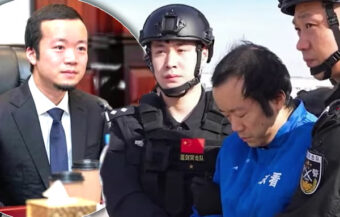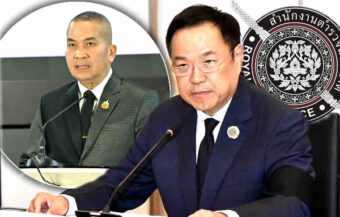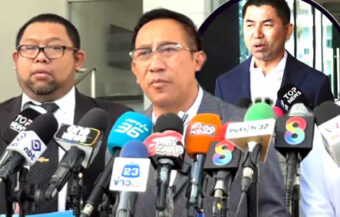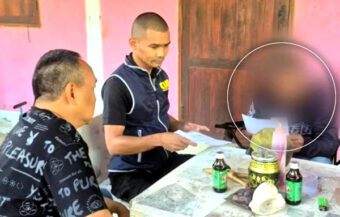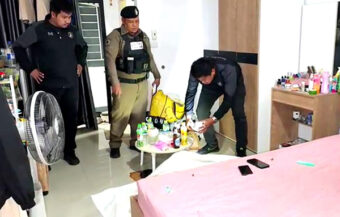Thailand plunges deeper into crisis as People’s Party backs Anutin for PM under strict conditions, then caretaker government counters within minutes by seeking parliamentary dissolution, raising fears of a full-blown constitutional and political meltdown.
Thailand’s political chaos deepened on Wednesday after a bombshell decision by the People’s Party to back Bhumjaithai leader Anutin Charnvirakul as the country’s 32nd prime minister. Within minutes, the caretaker government, led by outgoing PM Phumtham Wechayachai, hit back—announcing plans to dissolve parliament. The dramatic move has thrown the nation into uncharted territory. Legal experts and even the government’s own Council of State warned that the dissolution could breach the 2017 Constitution, raising fears of a full-blown constitutional crisis.
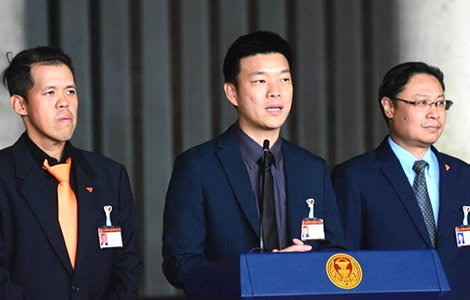
In a dramatic turn of events on Wednesday morning, the People’s Party (PP) stunned the political establishment. Its leader, Natthaphong Ruengpanyawut, declared full parliamentary support for Bhumjaithai Party (BJT) leader Anutin Charnvirakul as Thailand’s next prime minister — but under strict conditions.
However, even before the political dust could settle, the Pheu Thai Party (PTP) responded. Acting through caretaker Prime Minister Phumtham Wechayachai, the party submitted a formal request for a royal dissolution of the House of Representatives on Tuesday night. The move was confirmed on Wednesday morning.
People’s Party backs Anutin under strict terms as Pheu Thai counters with push to dissolve parliament
This twin-pronged development has sharply escalated Thailand’s political uncertainty. The country now stands at a constitutional crossroads.
During a press conference at Parliament, Mr. Natthaphong stated that PP would not join the new cabinet. Instead, his party — which commands 143 seats — would remain in opposition. Nevertheless, he stressed that PP would steer the minority government’s direction through its parliamentary leverage.
Crucially, the People’s Party’s support came with five binding conditions. First, the new BJT-led administration must dissolve the House within four months of announcing its policy platform. This would pave the way for a general election.
Secondly, if a constitutional referendum is deemed necessary, it must be conducted before or during the next election. However, if no referendum is needed, the constitution must be amended to create an elected drafting assembly during the current term.
Thirdly, Bhumjaithai must not seek or gain a majority in the House through political manoeuvring. Fourth, PP will retain its role in the opposition and will not hold cabinet seats. Lastly, all agreements must be formalised in writing through a memorandum of agreement (MoA).
People’s Party will support Bhumjaithai only if it agrees to election, reform and opposition oversight
Anutin Charnvirakul, in a brief statement, said he welcomed the support and accepted all conditions without negotiation. He later met with his MPs behind closed doors.
Meanwhile, the caretaker government didn’t wait. According to Pheu Thai’s Secretary-General Sorawong Thienthong, Prime Minister Phumtham submitted the House dissolution request on Tuesday evening. He said the move was urgent and necessary to prevent the formation of an “unstable minority government.”
He warned that Bhumjaithai, backed by only 130 MPs, lacked the votes to govern effectively. According to him, “Returning power to the people is the only way forward.”
Nonetheless, this move triggered immediate legal debate. The Council of State, the government’s legal advisory body, reportedly opposed the caretaker PM’s authority to dissolve Parliament. Despite this, Mr. Phumtham doubled down, stating that national confusion justified the action.
He also attacked PP’s decision to both support and oppose the new government. “You can’t be both government and opposition,” he said. “This only worsens economic instability.”
Caretaker PM says dissolution is urgent as legal experts warn it may breach the 2017 constitution
Back at Parliament, Mr. Natthaphong — nicknamed “Teng” — defended the move. He said his party had spent five days in deep internal consultation. A total of 25,000 party members participated in a closed survey to determine the party’s next step.
After rigorous debate, he said the party reached a unanimous decision: to use their 143 votes to push the country toward a swift election. More importantly, they aimed to open the door to constitutional reform.
He made it clear: “This is not about popularity. If Bhumjaithai breaks its word, they will face the people’s judgment.”
Moreover, he said this decision was not taken lightly. “We assessed the risk. But inaction would have been worse.”
He added that the MoA was still on his desk and had yet to be signed. However, once signed by both parties, it would become binding. Mr. Jessada Thaiset, a BJT MP, later accepted the unsigned document on Anutin’s behalf.
When asked about the enforceability of the agreement, Mr. Natthaphong was blunt. “If Bhumjaithai betrays this agreement, they’ll pay with their political lives.”
People’s Party vows Bhumjaithai will be held accountable if it breaks the agreement or delays the election
For years, the Bhumjaithai Party, while a minority partner in government, has been accused of blocking constitutional reform. Yet, Mr. Natthaphong said the urgent need for change outweighed past grievances.
“If we wait for perfect trust, we will never move forward,” he added. “We’re not here to forgive — we’re here to force action.”
He emphasised that PP was not endorsing Anutin as a long-term leader. Rather, he was being positioned as a caretaker prime minister tasked solely with dissolving Parliament and initiating reform.
“The new government’s job is clear: dissolve the House in four months, and begin the process for a new charter.”
If the Constitutional Court mandates two referendums, PP will support that process. But the four-month deadline, he said, is non-negotiable.
He also emphasised readiness. “We are prepared for elections every single day. Our duty is to serve the people with policies and direction.”
Natthaphong says Bhumjaithai’s role is only temporary and tied to charter reform, followed by a quick election
When asked if Pheu Thai’s dissolution request was politically motivated, he shrugged off the question. “It’s not pressure. Each party is doing what it believes is right.”
He also said Pheu Thai must now formally confirm whether the dissolution request was submitted and accepted. “We need clarity. Rumours are no basis for decision-making,” he said.
According to Mr. Natthaphong, PP’s path is simple but difficult. They do not trust any prime minister outright. However, they trust the public’s ability to punish betrayal.
“This MoA is our guarantee,” he said. “If Bhumjaithai betrays it, the backlash will be historic.”
Following the press conference, reporters asked Mr. Natthaphong whether the new MoA would suffer the same fate as the one torn up by the Move Forward–Pheu Thai coalition earlier this year. He did not answer. Instead, he offered only a quiet smile.
Natthaphong says public—not politicians—will be final judge if Bhumjaithai violates its reform pledge
Meanwhile, opposition whip Pakornwut Udompipatsakul confirmed the parliamentary calendar. A vote for the prime minister could take place as early as Friday, September 5, if the agenda is formally added today.
First Deputy House Speaker Chalat Khamchuang issued an internal memo on Tuesday evening. It stated that both government and opposition whips would meet to discuss scheduling the PM vote.
Wednesday may be another red-letter day in Thai politics, starting with the People’s Party’s call on PM
Regardless of the final outcome, one thing is clear: Thailand’s political ground is shifting fast. A minority government is looming. A fresh election is likely. And with the People’s Party now holding the balance of power, the road to a new constitution may have just opened — or fractured even further.
In Mr. Natthaphong’s words: “This is not a perfect choice. But it is the only way forward.”
Join the Thai News forum, follow Thai Examiner on Facebook here
Receive all our stories as they come out on Telegram here
Follow Thai Examiner here
Further reading:
People’s Party meeting on Monday ended in chaos as it failed to decide on who it will support for PM
Strong case for Chaikasem Nitisiri to lead an interim government tasked with Constitutional change
Pheu Thai rattled by PM’s ouster. Risks complacently assuming the Premiership of Chaikasem Nitisiri
PM Paetongtarn Shinawatra ousted by Constitutional Court, collapsing Thai government over audio clip





